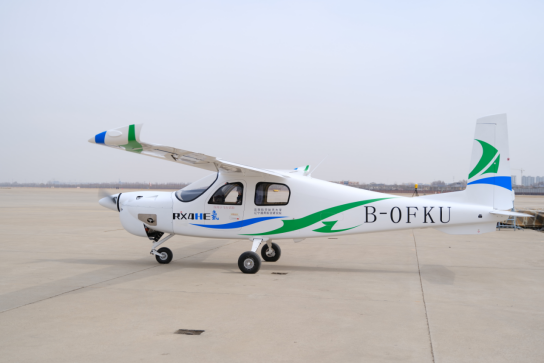The first four-seater hydrogen-fueled internal combustion engine aircraft verification prototype, initiated by Academician Yang Fengtian of the Chinese Academy of Engineering, made its maiden flight at an airport in Shenyang on March 25, 2023. Equipped with the first 2.0-liter zero-emission supercharged direct-injection hydrogen-fueled internal combustion engine developed by FAW Group on the basis of the "Hongqi" gasoline engine, this aircraft is the first self-developed general aircraft powered by a hydrogen internal combustion engine.

Funded by the "Four-seater Hydrogen Internal Combustion Engine Aircraft Verification Prototype Development" project of Department of Science and Technology of Liaoning province, Shenyang Aerospace University has started to organize the Liaoning General Aviation Academy to carry out the development of the aircraft since 2021. On the basis of "Rhyxeon" series electric aircraft and with Academician Yang Fengtian as the technical director, the Liaoning General Aviation Academy worked closely with FAW Research and Development Institute, Harbin Institute of Technology, Tianjin University, United Automotive Electronic Systems, Beijing Institute of Technology, Tianjin Internal Combustion Engine Research Institute (Tianjin Motorcycle Technology Center), and BeijingJonton Hydrogen Technology Co., LTD to demonstrate the application of hydrogen-fueled internal combustion engine in aviation. Besides, based on the "Hongqi" 2.0-liter zero-emission supercharged direct-injection hydrogen-fueled special engine developed by FAW Group, the aviation adaptability design has been upgraded, and the research work of the four-seater hydrogen-fueled aircraft verification prototype powered by this engine has been carried out.
With a wingspan of 13.5 meters, a length of 8.2 meters and cruising speed of 180km/h, the aircraft adopts the configuration of high wing, low tail, front propeller and front three-point non-retractable landing gear; the aircraft uses high-pressure gaseous hydrogen storage with hydrogenstorage weight of 4.5kg; the maximum thermal efficiency of hydrogen internal combustion engine is greater than 43% and the comprehensive thermal efficiency than 40%; theloiter cruise time is longer than 1 hour.
Because hydrogen internal combustion engines have no special requirements for hydrogen purity, and can use the technology and production linesalready available in the industry, they have advantages over hydrogen fuel cells in price. With hydrogen as a power source, the aircraft has the advantages of high calorific value, no pollution, and wide resource sources, which enables it to maintain high work efficiency while carbon emissions are being reduced, thus helping to achieve thedual zero-carbon goal in the aviation industry as soon as possible.

The successful maiden flight of the four-seater hydrogen-fueled internal combustion engine aircraft verification prototype validates the feasibility ofhydrogen internal combustion engines as aerospace power, overcomes a series of key technological difficulties, and lays a solid foundation for the subsequent development of hydrogen-powered aircraft.
First reviewed and proofread by Kang Guiwen
Further reviewed and proofread by Fengxia
Finally reviewed and proofread by Xue Jijia